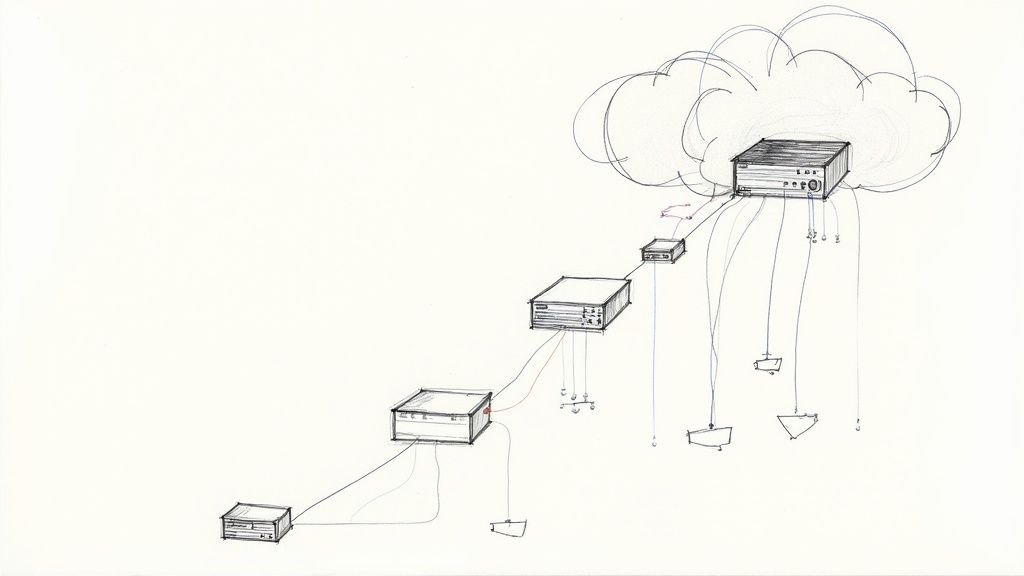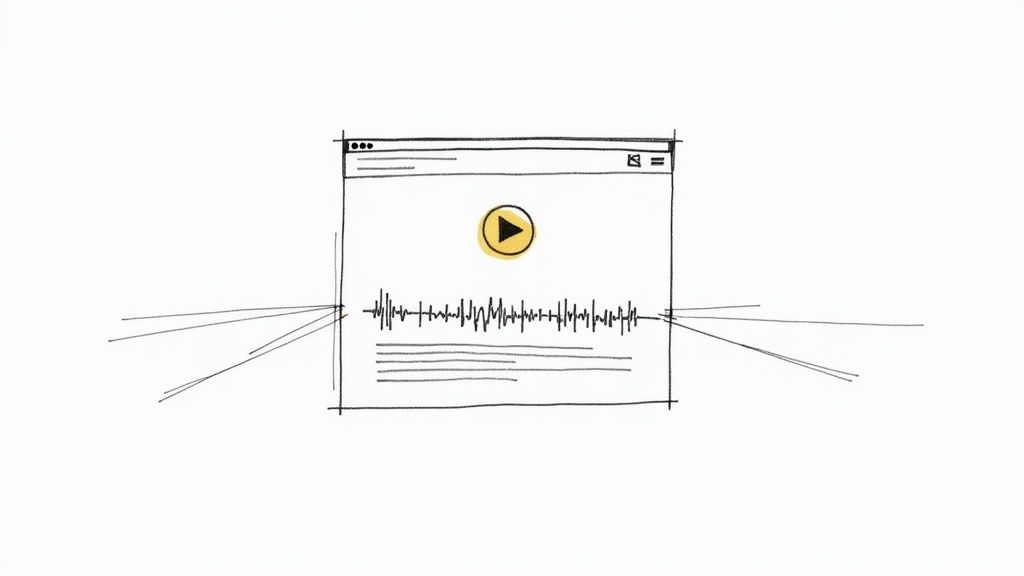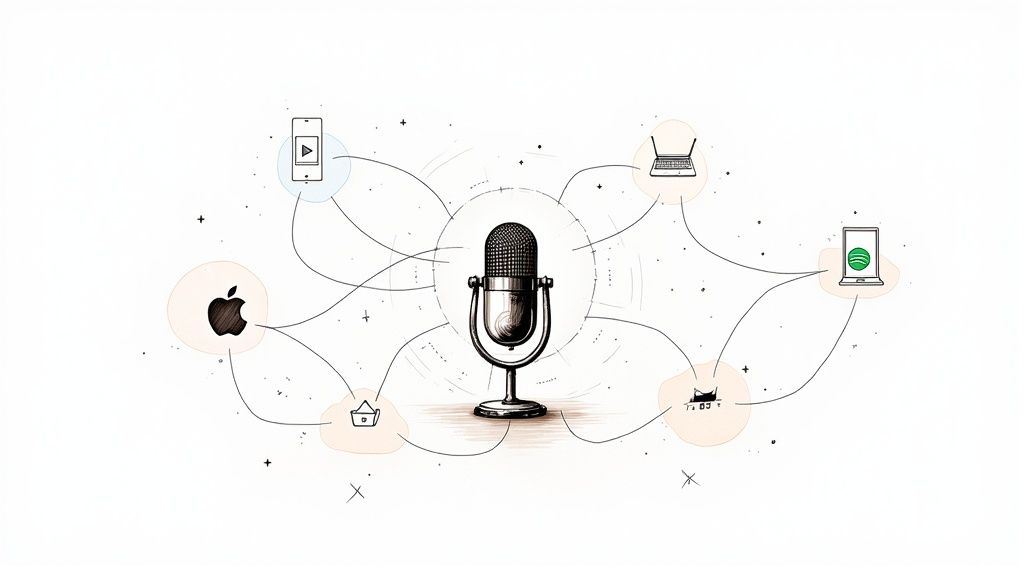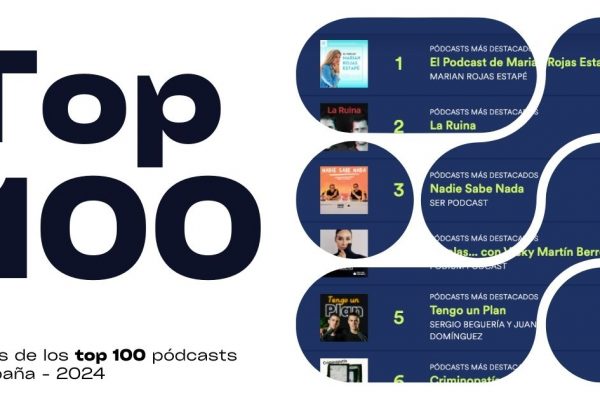
Creating a podcast is an exciting first step, but it’s not enough. To ensure your work reaches the people you want to reach, you need a solid distribution strategy. Just as a good book needs a publisher to reach its readers, your podcast needs a plan to connect with its audience. In this guide, we’ll explore the different options available for publishing your podcast and understand why distribution is as important as the content itself.
Why is distribution vital?
Distribution is the bridge that connects your podcast with your listeners. It’s what allows your voice, your ideas, and your stories to be heard beyond your immediate circle. A podcast with limited distribution is like a conversation in an empty room. For example, if you only publish a podcast on a platform with few users, you’ll be missing the opportunity to reach a much larger audience. That’s why understanding the different distribution options is crucial for the success of your podcast.
Different paths to distribute your podcast
Fortunately, there are several ways to publish a podcast. From specialized hosting platforms to popular directories like Apple Podcasts and Spotify, and even social networks like YouTube. It’s also important to consider integrating your podcast into your own website. Each option has its own advantages and disadvantages, and in the following sections, we’ll analyze each one in detail. This will allow you to choose the combination of platforms that best suits your needs and helps you achieve your goals.
Popular Podcast Directories

Once you have your podcast ready, the next question is: where do I publish it? Podcast directories are a fundamental part of the answer. These function as large online catalogs, where listeners can search for and discover new programs. Publishing in these directories is like putting your podcast in a showcase visible to millions of people.
Streaming Giants: Spotify and Apple Podcasts
Two of the most important directories are Spotify and Apple Podcasts. Spotify, with its enormous user base, offers a great opportunity to reach a global audience. Its analytics tools allow you to understand who listens to you, where they do it from, and which episodes they prefer. Apple Podcasts, on the other hand, has the advantage of being pre-installed on Apple devices, giving you access to an already established audience. Publishing on both platforms is essential to maximize your visibility.
Other Important Options: Amazon Music, and more
In addition to Spotify and Apple Podcasts, there are other platforms you should consider. Youtube Music, for example, integrates perfectly with Google’s search engine and the Android operating system, making it easier for people to find you in searches. Amazon Music, with its growing popularity, is also an option to consider. Finally, directories such as Stitcher, TuneIn, and Pocket Casts, although more specific, can help you connect with particular audience niches.
YouTube: The Video Giant also for Podcasts
Although it’s not a podcast directory in the traditional sense, YouTube offers a unique opportunity. Many users prefer the video format, and YouTube allows you to upload your episodes with a static image or even create more elaborate visual content. This opens the doors to an even larger audience and allows you to take advantage of the platform’s promotional tools.
Choosing the Right Directories for Your Podcast
The key to effective distribution is choosing the right directories for your audience. Research where the people you’re targeting listen to podcasts. If your podcast is about business, for example, LinkedIn might be a more effective platform than TikTok. Once you’ve chosen your platforms, consistency is key. Publish new episodes regularly to keep your audience hooked.
Podcast Hosting Platforms

Choosing a hosting platform is a crucial step in distributing your podcast. Think of it as the warehouse where your episodes are stored and from where they are distributed to different directories. This platform generates the RSS feed, which is essential for your podcast to be found and played on other applications.
Why do you need a hosting platform?
Publishing directly from your computer is not a viable long-term option. A hosting platform ensures that your episodes are available 24 hours a day, 7 days a week, to anyone in the world. Additionally, it offers you tools to manage your podcast, analyze download statistics, and in some cases, even monetize your content.
Key features of a good hosting platform
When choosing a hosting platform, look for one that offers sufficient storage for your episodes, an RSS feed, detailed statistics, monetization tools, and, of course, an easy-to-use interface. These features will help you manage your podcast efficiently and understand your audience.
Examples of hosting platforms
There are several podcast hosting platforms, such as Buzzsprout, Libsyn, Blubrry, Podbean, and Mumbler. Each offers different plans and features. Mumbler, for example, stands out for its monetization tools and advanced metrics. Research each one to find the one that best suits your needs and budget.
Social Media Platforms

Social media platforms are an essential complement to your distribution strategy. They don’t directly host your podcast, but they allow you to connect with your audience, promote new episodes, and build a community. They’re like loudspeakers that amplify your message and direct your listeners to your podcast.
Creating a community on social media
Social media allows you to interact with your listeners in a more personal way. You can share extra content, answer questions, conduct polls, and generate excitement for upcoming episodes. This interaction fosters loyalty and turns your listeners into followers.
Choosing the right platforms
It’s important to choose social media platforms where your target audience is present. If your podcast is about fashion, Instagram might be a better option than LinkedIn. Research where your ideal audience spends their time and focus your efforts on those platforms.
Optimizing your social media presence
Use attractive images, write concise descriptions, and use relevant hashtags to maximize your reach. Share direct links to your episodes and maintain active communication with your audience.
Inegration with your Website

Integrating your podcast into your website gives you total control over the listener’s experience. It’s like having your own store, where you can design the space and present your products in the way you prefer.
Benefits of hosting your podcast on your website
By hosting your podcast on your website, you can integrate the player with your existing design, collect data about your listeners, and offer a cohesive user experience.
How to integrate your podcast into your website
You can embed the player from your hosting platform directly into your website. Platforms like Buzzsprout, Libsyn, and Mumbler offer easy-to-use embed codes.
Optimizing integration for SEO
To improve your podcast’s search engine ranking, use relevant keywords in the title and description. Include transcripts of your episodes so Google can index the content.
Distribution Strategy

Now that we’ve seen the different platforms, it’s important to create a comprehensive distribution strategy. It’s like planning a trip: you need a map and a clear destination to get where you want to go.
Creating a solid plan
Define your target audience and where they spend their time online. This will help you choose the right platforms for your podcast.t.
Diversify your distribution
Use a combination of directories, social media, and your own website. Each platform will help you reach different segments of your audience.
Consistency and cross-promotion
Publish new episodes regularly and promote your podcast across all your platforms. Create links between your website, social media, and podcast directories.
Analyze and adapt
Use analytics tools to understand what works and what doesn’t. Adjust your strategy based on the results you obtain.
And remember:
Effective distribution is crucial for the success of your podcast. Just as a good musician needs a good instrument, a good podcaster needs a good distribution strategy.
Remember the importance of directories, hosting platforms, social media, and your website. Each element plays an important role in your strategy.
Next steps to publish a podcast
Choose the right platforms, create a publishing schedule, and share your podcast with the world. Mumbler can be an excellent option for hosting and distributing your content. Visit Mumbler today.
About the author
Content Manager at Mumbler.
Podcaster and content creator.
Passionate about communication and a fan of the WordPress community.
I talk about movies and series on Babel Infinito.
I talk about podcasting on Todo por Un Podcast.







